Something is lurking in the heart of quasar 3C 279
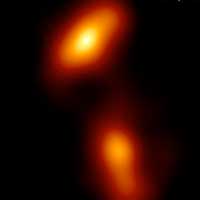 Astronomers observed the finest detail ever in the relativistic jet that is believed to originate from the vicinity of a supermassive black hole.
Astronomers observed the finest detail ever in the relativistic jet that is believed to originate from the vicinity of a supermassive black hole.
Apr 7th, 2020
Read more
 Subscribe to our Space Exploration News feed
Subscribe to our Space Exploration News feed
 Astronomers observed the finest detail ever in the relativistic jet that is believed to originate from the vicinity of a supermassive black hole.
Astronomers observed the finest detail ever in the relativistic jet that is believed to originate from the vicinity of a supermassive black hole.
Apr 7th, 2020
Read more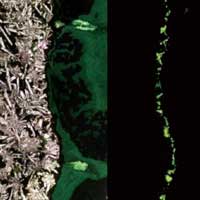 Newly discovered single-celled creatures living deep beneath the seafloor have given researchers clues about how they might find life on Mars. These bacteria were discovered living in tiny cracks inside volcanic rocks after researchers persisted over a decade of trial and error to find a new way to examine the rocks.
Newly discovered single-celled creatures living deep beneath the seafloor have given researchers clues about how they might find life on Mars. These bacteria were discovered living in tiny cracks inside volcanic rocks after researchers persisted over a decade of trial and error to find a new way to examine the rocks.
Apr 3rd, 2020
Read more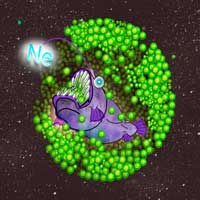 Neon inside a certain star core can eat so many electrons, it causes the star to collapse into a neutron star and produce a supernova.
Neon inside a certain star core can eat so many electrons, it causes the star to collapse into a neutron star and produce a supernova.
Mar 30th, 2020
Read more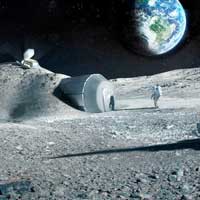 The modules that the major space agencies plan to erect on the Moon could incorporate an element contributed by the human colonizers themselves: the urea in their pee. Researchers have found that it could be used as a plasticizer in the concrete of the structures.
The modules that the major space agencies plan to erect on the Moon could incorporate an element contributed by the human colonizers themselves: the urea in their pee. Researchers have found that it could be used as a plasticizer in the concrete of the structures.
Mar 27th, 2020
Read more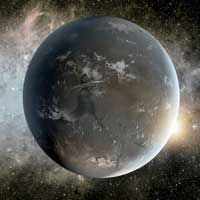 Astronomers have created five models representing key points from our planet's evolution, like chemical snapshots through Earth's own geologic epochs. The models will be spectral templates for astronomers to use in the approaching new era of powerful telescopes, and in the hunt for Earth-like planets in distant solar systems.
Astronomers have created five models representing key points from our planet's evolution, like chemical snapshots through Earth's own geologic epochs. The models will be spectral templates for astronomers to use in the approaching new era of powerful telescopes, and in the hunt for Earth-like planets in distant solar systems.
Mar 27th, 2020
Read more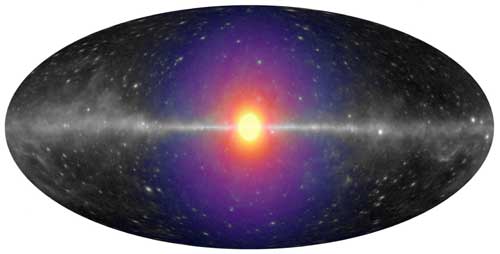 Study knocks down some theories for the origin of a mysterious light signature that has puzzled physicists for years.
Study knocks down some theories for the origin of a mysterious light signature that has puzzled physicists for years.
Mar 26th, 2020
Read more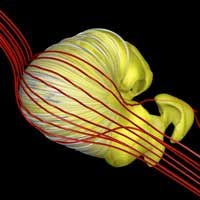 Astrophysicists reveal a new model of our heliosphere that?s shaped somewhere between a croissant and a beach ball.
Astrophysicists reveal a new model of our heliosphere that?s shaped somewhere between a croissant and a beach ball.
Mar 24th, 2020
Read more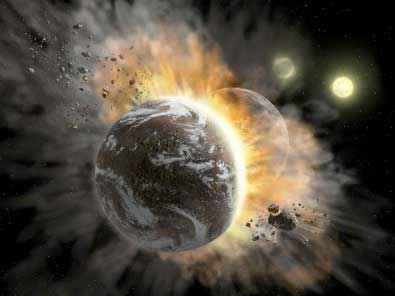 Model developed by astrophysicists shows chaotic phase that placed objects in current orbits beginning within first 100 million years after formation of giant planets.
Model developed by astrophysicists shows chaotic phase that placed objects in current orbits beginning within first 100 million years after formation of giant planets.
Mar 24th, 2020
Read more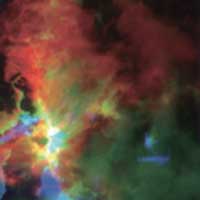 Astronomers have captured new, detailed maps of three nearby interstellar gas clouds containing regions of ongoing high-mass star formation. The results of this survey, called the Star Formation Project, will help improve our understanding of the star formation process.
Astronomers have captured new, detailed maps of three nearby interstellar gas clouds containing regions of ongoing high-mass star formation. The results of this survey, called the Star Formation Project, will help improve our understanding of the star formation process.
Mar 23rd, 2020
Read more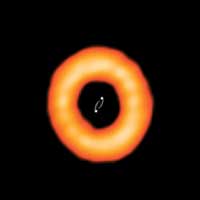 Astronomers have found striking orbital geometries in protoplanetary disks around binary stars. While disks orbiting the most compact binary star systems share very nearly the same plane, disks encircling wide binaries have orbital planes that are severely tilted. These systems can teach us about planet formation in complex environments.
Astronomers have found striking orbital geometries in protoplanetary disks around binary stars. While disks orbiting the most compact binary star systems share very nearly the same plane, disks encircling wide binaries have orbital planes that are severely tilted. These systems can teach us about planet formation in complex environments.
Mar 19th, 2020
Read more Physicists will develop instruments to directly image exoplanets.
Physicists will develop instruments to directly image exoplanets.
Mar 19th, 2020
Read more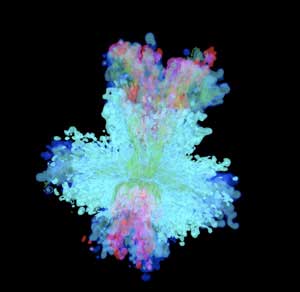 Simulations suggest that two stars came together to form a blue supergiant, which subsequently exploded.
Simulations suggest that two stars came together to form a blue supergiant, which subsequently exploded.
Mar 19th, 2020
Read more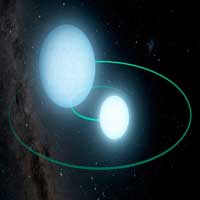 Scientists have discovered a pulsating ancient star in a double star system which will help further our understanding of how stars like the Sun evolve and die.
Scientists have discovered a pulsating ancient star in a double star system which will help further our understanding of how stars like the Sun evolve and die.
Mar 17th, 2020
Read more Researchers have shown a way to determine the origins and nature of quasar light by its polarization. The new approach is analogous to the way cinema glasses produce a 3D image by feeding each eye with the light of a particular polarization: either horizontal or vertical.
Researchers have shown a way to determine the origins and nature of quasar light by its polarization. The new approach is analogous to the way cinema glasses produce a 3D image by feeding each eye with the light of a particular polarization: either horizontal or vertical.
Mar 13th, 2020
Read more An updated catalog of trans-Neptunian objects, and the methods used to find them, could aid in future searches for undiscovered planets in the far reaches of the solar system.
An updated catalog of trans-Neptunian objects, and the methods used to find them, could aid in future searches for undiscovered planets in the far reaches of the solar system.
Mar 12th, 2020
Read more Billions of lightyears away, gigantic clouds of hydrogen gas produce a special kind of radiation, a type of ultraviolet light known as Lyman-alpha emissions. The enormous clouds emitting the light are Lyman-alpha blobs (LABs). LABs are several times larger than our Milky Way galaxy, yet were only discovered 20 years ago.
Billions of lightyears away, gigantic clouds of hydrogen gas produce a special kind of radiation, a type of ultraviolet light known as Lyman-alpha emissions. The enormous clouds emitting the light are Lyman-alpha blobs (LABs). LABs are several times larger than our Milky Way galaxy, yet were only discovered 20 years ago.
Mar 12th, 2020
Read more This exoplanet, 390 light years away towards the constellation Pisces, has days when its surface temperatures exceed 2,400 Celsius, sufficiently hot to evaporate metals. Its nights, with strong winds, cool down the iron vapour so that it condenses into drops of iron.
This exoplanet, 390 light years away towards the constellation Pisces, has days when its surface temperatures exceed 2,400 Celsius, sufficiently hot to evaporate metals. Its nights, with strong winds, cool down the iron vapour so that it condenses into drops of iron.
Mar 11th, 2020
Read more A hypothetical particle called the axion could solve one of physics' great mysteries: the excess of matter over antimatter, or why we're here at all.
A hypothetical particle called the axion could solve one of physics' great mysteries: the excess of matter over antimatter, or why we're here at all.
Mar 10th, 2020
Read more